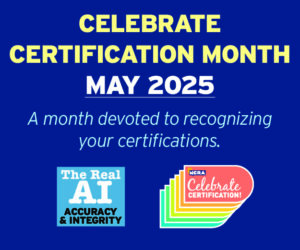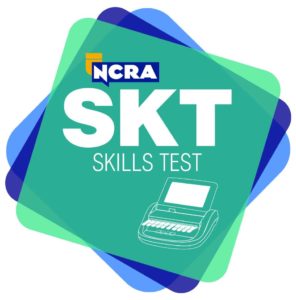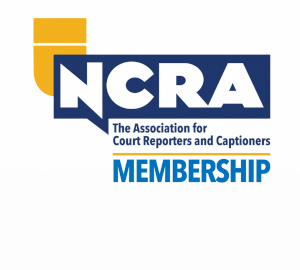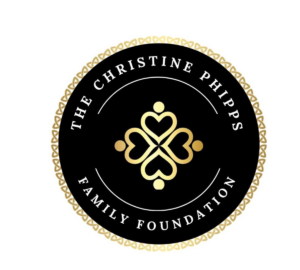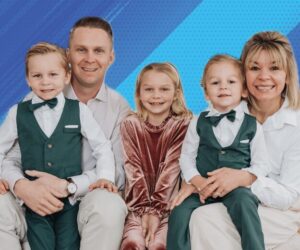Thanks to the generosity of the Utah Court Reporters Association, the National Court Reporters Foundation (NCRF) is pleased to announce the first group of recipients of its quarterly Career Launcher Student Grants program. Congratulations to Stacey Brantley and Susan Lee-Cho, students at South Coast College, in Orange, Calif., Yolanda Kong and Melissa Thai, students at the Downey Adult School in Downey, Calif., and Karen Collis, a student at Northern Alberta Institute of Technology (NAIT), in Alberta, Canada.
The Career Launcher Students Grants program offers five to seven grants each quarter to cover the cost for students to participate in the Career Launcher program. The January drawing was the first time recipients were awarded grants. The drawing was held, and the winners were announced during a live Facebook event earlier this month.
Grant recipient Melissa Thai said she learned about the court reporting profession when she was working in the medical field and a coworker commented about her typing skills and speed as well as her proficiency in writing and suggested the career. “Unfamiliar with this profession, I immediately checked out a local brick-and-mortar school and was instantly fascinated,” said Thai, who hopes to graduate from school in August.
Currently pursuing her 180 four voice and 200 jury charge, Thai noted that she plans to work as an official court reporter when she graduates, although she is open to other avenues of the profession as well. She said she is motivated to take the Career Launcher program because she wants to better prepare herself on what to expect when she does begin working professionally.
“The Career Launcher program will only serve as a stepping stone to my career by shedding new light on potential opportunities. By far, I love how this program provides real-life situations on not only what may occur, but on how we should handle them,” she said. “I have limited experience with depositions, and this alternate exposure gives me better insight on what’s to come. By utilizing this program, I know I will have a proper, solid, and ethical foundation on how to handle them on my own,” she added.
Thai said she firmly believes that knowledge is power and that the more you educate your mind, the more you are building your confidence, especially through doubts and challenges in school and in the working world. “Not only am I the starving student grateful for this chance to further my education, but I’m also grateful that this platform will serve as a kickstart to my involvement in the court reporting community,” she added.
Grant recipient Karen Collis said she has been surrounded by court reporting her entire life. Her mother has been a court reporter for 44 years, and a few years ago her sister also ventured into the profession. “I am truly immersed within this world. I have been attending the NAIT captioning and court reporting program for the last two and a half years. I know that it will take me however long it does, but I’m hoping to graduate at some point during the summer,” said Collis, who is currently writing at 200 words per minute in Q&A and 180 in Literary. Upon graduation, she plans on moving to Vancouver to start working with a firm where she will begin with car accidents and divorces.
“I decided to enter the drawing for this grant because even though my program has a great course to get you prepared for walking into the room, I am always open to new perspectives,” she said.
“There is no limit to learning. I’m hoping to gain some tips and tricks for walking in confidently, learning the dos and don’ts of interruptions, and finding out what each reporter does in different scenarios.”
One not to win drawings or raffles very often, Collis said she was surprised to win during the first round. “I would suggest that every student take advantage of this grant opportunity. I’m so grateful to have the chance to take this program and learn as much as I can. A big thank you to the Utah Court Reporters Association for making this a possibility,” she added.
“I didn’t know what to do with myself after graduating college,” said grant recipient Yolanda Kong. “I found a job at a court reporting agency in downtown Los Angeles through a post on Craigslist. I had never heard of court reporting before, but I knew I had the soft skills to interface at any workplace, and I was confident in my ability to learn software or any tasks needed for my role. I had no idea this job would change my life,” she added.
“My parents came to this country as war refugees with a middle school level education. Their belief, and mine, was that you go to school, find a job that fits your skill level, and someone gives you a schedule that you then fit your life around,” Kong said. Working at the court reporting firm was the first time, she said, she saw people fit their job around their life.
“Some reporters only wanted to work mornings; some didn’t work while their kids weren’t in school; some worked as much as we would work and then took a vacation for a month. And all of those situations were acceptable and accommodated. I needed to know more,” Kong added.
It was when Kong moved into the accounting department at the firm that said she understood the financial security and freedom of choice that came to the career. “I’ll never forget the day I did payroll and wrote someone a check that made me double- and triple-check the numbers. In a two-week pay period, someone could earn what other people make in an entire year working full time. (To the court reporting students who are pushing to get through, read that last sentence again.) Court reporting went from a niche job to a secret world of potential I stumbled upon,” she said.
Although life threw some obstacles her way in the time between looking into court reporting schools and starting at Downey Adult School, Kong is now a qualifier for the California CSR and plans to start testing for her RPR this summer.
“Being awarded the NCRF Career Launcher grant feels like a reassurance that I’m on the right path. I think the Career Launcher program will be an immense resource in exposing students to the things we don’t cover in school, like marking exhibits or tracking jobs and billing. After licensing, I hope to return to Los Angeles and begin my professional journey as an official in our country’s largest judicial system. My ultimate dream is to travel and freelance in different metropolitan areas of the United States, mostly to eat my way across the country,” Kong said.
Grant recipient Stacey Brantley said she has always been captivated by the court reporter while she was serving jury duty. At the age of 51, she decided to quit a longtime job and research the court reporting profession. Currently writing at 170 words per minute, she hopes to become an official court reporter upon graduation. She noted that she is anxious to start the Career Launcher program because she believes it will best prepare her to enter the workforce.
“I encourage anyone to gain as much knowledge as possible. Winning the grant means an added level of confidence in my preparation and hopefully a slight edge over the competition,” Brantley said.
Susan Lee-Cho, also a grant recipient, said she is very excited and honored to be one of the chosen winners in this first round of quarterly drawings. “I hope to be graduating this year. After graduation, I look forward to becoming a freelance deposition reporter in both the states of California and Texas,” Lee-Cho said.
“I look forward to taking the Career Launcher program to be as prepared and knowledgeable as I can be to be the best court reporter I can be,” she added.
Students interested in applying for the grant must complete an application form. Completed applications will be entered into the next drawing which will be held on April 15. Applications are due no later than 5 p.m. Eastern on April 14. Applications not drawn as winners will be included in all future quarterly drawings. The cost for the student program is currently $100 for members and $175 for nonmembers.
Career Launcher is designed to serve as a bridge or provide tips of the trade for students and new professionals between graduation and their first job, exposing them to myriad real-life situations. Candidates who participate in the program create a transcript, self-assess their transcript and complete a five-question quiz. The program is offered through the NCRA Learning Center.
Left to right: Yolanda Kong, Karen Collis, Susan Lee-Cho, Kimberly Coltrain, RSR
Career Launcher program benefits returning professionals too
Kimberly S. Coltrain, RSR, from Grayson, Ga., graduated from court reporting school 30 years ago, right before a hiring freeze. Her life went in a different direction, but “the flicker of court reporting never completely extinguished.” Twenty-seven years later, Coltrain went back to school. In addition to court reporting school, she is also enrolled in the NCRF Career Launcher program. She recently shared with the JCR Weekly her experience with the course.
JCR | Are you currently a student and if so, what program do you attend and what speed are you writing at?
KC | I am currently an online student at College of Court Reporting in Valparaiso, Ind. I am in the steno machine program, and I have one 225 Q mentor test to pass to complete the program. I am applying for licensure in Washington State to freelance. I have earned the NCRA RSR (Registered Skilled Reporter) certification. However, my state of residence, Georgia, does not accept the RSR. I also work full-time, and I am eight years away from retirement. Being able to serve in Washington State will allow me to take afternoon assignments remotely due to the time zone difference. I am one 225 testimony away from earning the RPR certification.
JCR | How did you hear about the profession?
KC | I first heard about court reporting in 1988 as a senior in high school. I graduated from Stenotype Academy in lower Manhattan in 1990 and worked as a per diem official for New York Civil circuit for one year. After various series of life events, I returned to court reporting and enrolled at CCR in 2017.
JCR | What attracted you to enroll in the Career Launcher program?
KC | I thought this would be a wonderful opportunity to assist me in understanding the facets of the court reporting field that have changed over the 25-plus years that I have been out of the field. I also wanted as much of a real-world experience as possible that school could only give scenarios of. The Career Launcher program pulls all the different aspects of deposition reporting together.
JCR | How far along in it are you?
KC | I am currently in the second module.
JCR | What has been the greatest benefits of this program for you so far?
KC | The greatest benefits of this program for me has been the candidate guidance given for each module. The guidance outlines the nuances a new reporter (or even a seasoned one) may not consider such as items that may need to be redacted and encouraging reporters to confirm state regulations and agency best practices.
JCR | What would you say to others to encourage them to enroll in the program?
KC | If you desire to give yourself an opportunity to enhance your skill set and provide your best service to clients, this program is a must. Not only does it give instruction of professionalism, but it also provides an overview of how to maintain control and decorum of the legal proceeding.
JCR | How has it been working with the graders in terms of feedback?
KC | I am pleased with the graders giving page and line number so that the participant can locate and note corrections. I also appreciate the constructive responses with the corrections.
JCR | Are there any changes you would suggest making to the program and if so, what are they?
KC | I haven’t felt a need to suggest any revisions to the program at this time.
You can read more about Kimberly Coltrain here.




